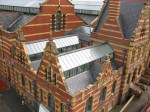A Walk Around Victoria Baths: Part II
Article published: Thursday, September 30th 2010
 In the second part of a guided tour around Victoria Baths, Michael Pooler looks at what the Baths tell us about how people lived when it was built and wonders what its future may be.
In the second part of a guided tour around Victoria Baths, Michael Pooler looks at what the Baths tell us about how people lived when it was built and wonders what its future may be.
The bathing habits of early users of Victoria Baths is another factor indicative of prevailing living conditions of the early 20th century Manchester. On the day before the weekly change of the water, so-called “Dirty Day” due to the rank state of the water, entrance was cheaper. These days were far busier, highlighting the paucity of disposable income of Mancunians and where priorities lay. Before the introduction of chlorine in water for reasons of hygiene, Barry tells me that breakouts of infectious diseases caused the baths to be closed for reasons of public health.
Equally, the existence of slum houses without basic wash facilities across Manchester accounts for the continuing use of individual cubicles with bathtubs until the early 1970s. This aptly illustrates how the two-fold nature of the function of the baths was played out along socio-economic lines. While the middle and upper classes – who largely had access to baths at home – used the baths as a source of leisure and recreation, for many families during industrial times who possessed only a tin bath or bowl in the kitchen, it was a necessary amenity for hygiene.
That the baths hosted a broad spectrum of Manchester society from working class families to the upper echelons of business and even the criminal fraternity is symbolised by the once-lavish Turkish baths. Local legend has it that well-known gangsters would seal their deals in the hot dry heat, reserved for those who could afford the expense. Yet while it would appear that the baths segregated people according to class and income, the irony is that they would have been under the same roof.
The establishment was also pioneering in the domain of hydrotherapy, being the first municipal baths in Britain to have installed an “Aerotone” in 1952. This device, consisting of a steel tank sunk into the floor in which springs of hot water were pumped, is similar to a modern-day Jacuzzi. It was used to rehabilitate and treat injuries; among its users at one point were the players and physio staff of football clubs Manchester United and Manchester City, many years before the explosion of revenues in football meant they could afford their own facilities.
The ultimate goal of the Friends of the Baths is to restore the building to its former functional glory. A massive step was taken in this direction when it became the first project to win the BBC2 ‘Restoration’ series which saw funding to the tune of £3.5m in 2002. It currently receives support from the Lottery, English Heritage and Manchester City Council.
Nowadays the building is home to various activities: from exhibitions of up and coming artists, a performance space for secondary school amateur dramatics and the local history fair to being used as a scene for shooting of TV drama ‘Life on Mars’.
So what does the future hold? As of today there is still no national swimming museum in Britain and the grandeur and history of the baths justifies its consideration as a potential site. But the existence of other, more modern swimming pools and the increasing popularity of private membership gyms pose an obstacle to funding.
Despite the enormous potential of the site and its architectural value there appears to be an inertia paralysing meaningful action to fully restore the site. However those involved remain hopeful that “We are working with the Council to decide on a future use for the Baths, as well as improving access for the community. It is a fantastic building, rich in history, that deserves to be preserved and restored,” says Neil Bonner, the project manager.
Until then, volunteers will continue to service a grand building which offers a stirring snap-shot of Mancunian society across a broad time-span.
This article originally appeared in an unabridged form on the Now Then Manchester website, a free independent monthly magazine born from grass roots culture, community and entertainment.
http://nowthenmanchester.blogspot.com/
More: Features, Manchester
Comments
No comments found
The comments are closed.



